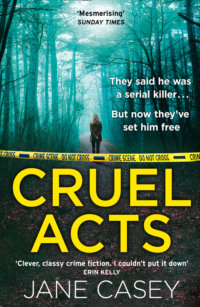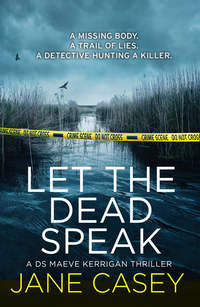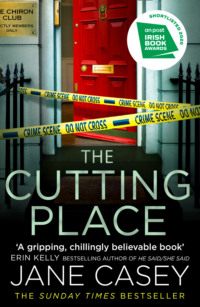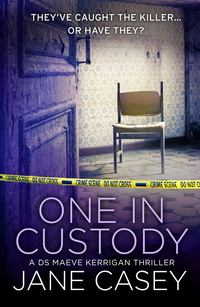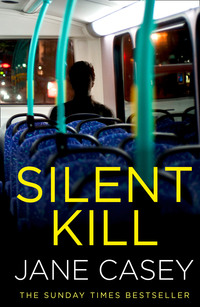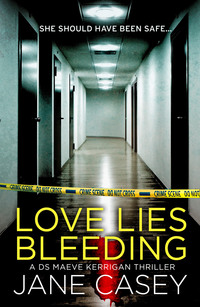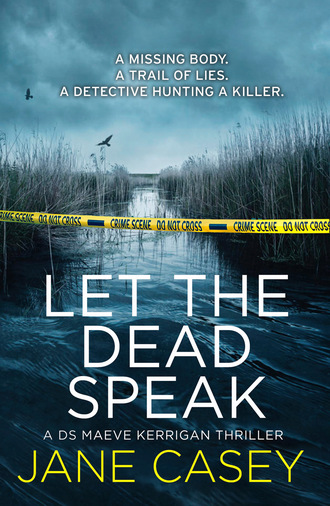
Полная версия
I held up my warrant card and he stepped down from the doorway to inspect it, moving with feline grace.
‘Maeve Kerrigan,’ he read.
‘Detective Sergeant Maeve Kerrigan,’ I said. ‘I’m part of the team investigating what happened up the road.’
‘Yeah, what did happen? I saw all the excitement. Everyone coming and going. Very intriguing. Nothing much ever happens here.’ He flicked the butt of his cigarette away then folded his arms across his chest, pushing his biceps with his fists to make himself look bigger.
‘Do you know the residents of number twenty-seven?’
‘A little. I know what they look like.’ He had stepped back a bit and found some high ground on a loose brick that was by the gate so he could stare into my eyes. His irises were light brown, almost gold, like a lion. Like a predator. The hairs stood up on the back of my neck. Humans were still animals when all was said and done.
‘But to speak to?’
‘No. You know what London is like. No one knows their neighbours.’
‘Depends on the area.’
‘And the neighbours.’ He laughed softly. ‘No one wants to know us so we don’t know them. That’s why you’re here, isn’t it? Because someone told you to come and talk to me. Because I’m the local scum so if something’s happened in the street it must have been me.’
‘It’s my job to talk to potential witnesses. You live in this street and I’m told you spend a lot of time out here watching people come and go.’
‘You’re told that.’ A slow smile spread across his face. One of his front teeth was crooked, overlapping the other by a couple of millimetres, and it was strangely charming. ‘Let me guess. Who could have told you? So many suspects. This is like doing your job, isn’t it? I can see why you like it. It could have been Narinder across the way, but I think she likes to see me out here. She’s always watching.’ He lifted a hand and waved. I turned in time to see a curtain fall back into place in the house opposite. ‘It could have been the bitch next door but she was away for the weekend. Anyway, she’s too snobby to talk about me. She likes to pretend we don’t exist. So who hates the fact that I dare to show my face in public?’ Turner stroked his chin, pretending to ponder it. He had a few days’ worth of stubble but it was sparse and fine. ‘Who doesn’t like me talking to his daughter?’
‘Mr Turner—’
‘Got it, haven’t I?’ He leaned out so he could look down the street, towards Oliver Norris’s house. ‘I’ve tried to explain it to him. It’s not me making the running. Bethany’s the one who talks to me. It’s not as if I’m all that keen on hanging around with a fifteen-year-old. That’s the kind of thing that could get me in trouble.’ He took a tin out of his back pocket and set it on top of the gatepost. The sweet raw smell of tobacco floated out of it when he popped it open and picked out a cigarette paper. His hands were shaking very slightly as he made the roll-up. It was thin, with no filter, and the back of my throat ached at the thought of smoking it.
‘Mr Turner, I do need to talk to you. I wonder if we could go inside.’
‘We could go inside.’ He ran his tongue slowly along the edge of the paper to glue it together. ‘But you’ll have to put up with my mother if you do that. There’s a reason why I spend a lot of time out here and if you go in there you’ll find out what it is.’
‘I can cope.’
‘I’m not sure I can.’ He lit the cigarette and drew on it, coughing as he exhaled. ‘What a terrible rollie. It’s an embarrassment. I usually do much better than that.’
‘It’s bad for you, you know.’
‘No shit, Sherlock.’ He picked a shred of tobacco off his lower lip. ‘I like to live dangerously.’
‘I spoke to DCI Gordon,’ I said softly.
Turner went very still. ‘That was quick.’
‘I’m investigating a serious incident.’
‘You didn’t say what it was.’
‘No, I didn’t.’
‘Is it murder?’ He pulled at his lower lip again, nervously this time.
‘Why would you think that?’
‘Because. Because of the fuss. Because of the guys in white suits going in and out. I didn’t see a body bag.’ He over-balanced and almost fell off the brick.
‘There wasn’t one.’
‘So what happened?’
‘We don’t know yet.’
‘You don’t know?’ His eyebrows went up, sky-high. ‘Doesn’t usually stop the cops from talking to the press, does it?’
‘In your experience.’
‘In my very unpleasant experience.’ It was warm in the sunshine but I could see goosebumps on Turner’s arms and he shivered. ‘You’re right. I don’t want to talk about this out here. Come in.’
At his invitation, when he was good and ready. I recognised it for a power play and tried not to feel irritated. Derwent would have found some reason for saying no but I followed Turner to the door, where he stopped.
‘Just so you know, my mum is upstairs and I’d like her to stay there.’
‘I might need to speak to her.’
‘No. No, you don’t.’ He swallowed. ‘She won’t be able to help you, anyway. She’s not – she doesn’t notice things. She doesn’t go out. She doesn’t look out the window. She doesn’t even know anything’s happened.’
‘I still might need to speak to her.’
He bit his lip, then went into the house. It was cooler inside, the air still. A fly buzzed somewhere, the sound swinging from loud to soft and back again. There was an all-pervading smell of vinegar and lemon and the place was absolutely spotless.
‘You need to take your shoes off,’ he threw over his shoulder and padded into the sitting room. I did as I was told and followed him, blinking against the sunlight that streamed into the room. It was neatly furnished with a leather sofa and armchair, and a couple of small tables. What was mainly remarkable, though, was what I couldn’t see when I looked around. No ornaments. No books. No cushions. No rugs on the wooden floor.
Turner coughed again, his chest heaving. The hollow at the base of his throat deepened as he fought for air. ‘Sorry. Need my—’
He dug in his back pocket and pulled out an inhaler, handling it with the practised skill born of long usage. He turned away from me before he used it and I took the hint: this was private. I was intruding on a personal battle. I sat down, acutely aware of the wheezing, terrified in case it stopped. I knew, in theory, how to resuscitate someone, but that didn’t mean I wanted to do it.
‘Sorry,’ he managed.
‘It’s all right. Take your time.’
‘It happens now and then.’ Five words and three breaths to say them. I winced and took my radio out of my bag, holding it on my knee in case I needed to call for help in a hurry, for him rather than me. Suddenly the room made sense to me: hard surfaces. Wipe-clean leather upholstery. No dust. Vinegar and lemon because someone used homemade cleaning products instead of mass-produced chemicals. Nothing left to chance.
He stood with his back to me, his shoulders hunched, his head hanging down. The wheezing lessened, the breaths coming more regularly. Between his shoulder blades, the fabric of his T-shirt had darkened where he’d sweated through it.
‘Sorry about this,’ he said for the third time.
‘You don’t need to apologise.’ He was watching me out of the corner of his eye, I realised. There was something sly about it that put me on my guard; it was as if he was assessing the impact of the attack on me. ‘What triggered that? Do you know?’
‘I’m not very good at taking my medicine. I forget.’
Maybe you should try a bit harder, since it could actually kill you.
‘Was that a particularly bad one?’
‘Normal.’ He leaned against the chimney breast and ran a hand over his head. ‘Happens all the time. Anything can trigger it. Perfume. Chemicals. Dust. Change in temperature. I’ve got shit lungs.’
‘All the more reason not to smoke.’
‘That’s what they say.’
‘But you keep smoking.’
‘I’d give up if I wanted to live.’ His eyes were fixed on mine, hungry for a reaction. I shrugged.
‘Most people do.’
‘I thought you’d know by now I’m not like most people.’
I laughed. ‘What are you, twenty? Twenty-one?’
‘Twenty.’ His voice was flat.
‘I’ve never met a twenty-year-old who didn’t think they were exceptional. You saying that tells me you’re just like everybody else.’
‘Hey,’ he said, affronted.
‘Hey yourself.’ I leaned forward. ‘Look, I appreciate the effort you’re putting into this but you’re not going to impress me or shock me or whatever it is you’re trying to do. Drop the attitude and I’ll make this as quick as I can.’
He dug his hands into his pockets and shrugged. ‘OK.’
‘I’m here because your name came up when we made enquiries with the neighbours. I am not accusing you of anything.’
Turner’s mouth tightened but he stayed silent.
‘I know you know Chloe Emery. How would you describe your relationship?’
‘I only know her to speak to.’
‘Have you ever visited her house?’
‘I don’t remember.’
‘You don’t remember,’ I repeated.
‘No, then.’ The amber eyes flicked away from me, darting around the room for inspiration. ‘When we were younger, maybe.’
I sat back in my chair. ‘For someone who managed to avoid being charged with attempted murder, you’re a terrible liar.’
The smile spread over his face. ‘I wasn’t charged with attempted murder because I didn’t do it.’
‘Remember, I’ve spoken to DCI Gordon.’
Turner sat down slowly on the arm of the sofa. ‘What did he tell you?’
‘Everything he found out about you and Ben Christie. Which wasn’t much. Why wouldn’t Ben give evidence against you, William?’
‘Because I didn’t do it.’
‘The incident happened in an alley behind some shops. You were there and Ben Christie was there and Ben ended up with a stab wound in his stomach. It doesn’t take a great leap of imagination to guess what happened.’
‘You could guess, but you’d be wrong.’ Turner’s breathing was still a little fast but his eyes were bright; he was enjoying this.
‘What about the text messages on his phone?’
‘What about them?’
I opened my notebook to read out the exact words. ‘“u know wot u did” “Time 2 make it right” “u can’t back out now” – what was that about?’
‘I don’t remember. Nothing much. Teenage shit. Maybe he spilled my drink or borrowed a quid and didn’t pay it back.’ He yawned. ‘You know you’re talking about something that happened four years ago. I can’t be expected to recall all the details.’
‘He was your friend and he almost died. Of course you remember it,’ I snapped.
Turner lifted his hands and looked at them, turning them over to examine the palms. ‘I was covered in his blood. Did you know that?’
‘I’m not surprised. He was very badly injured.’
‘It was so hot, his blood. It got everywhere. Under my nails. On my shoes. I dream about it sometimes.’ He looked up at me again. ‘I saved his life. I called the ambulance.’
‘You stabbed him.’
‘Not me. I found him. I helped him.’
‘You met him in the alley near your school and you stabbed him.’
‘Did DCI Gordon tell you about the forensics?’ Turner asked, his eyes intent. ‘Did he tell you about the knife?’
‘Yes. He did.’
‘Whose knife was it?’
It was a kitchen knife, an ordinary one with a serrated blade, the kind you might use for cutting up vegetables. Mrs Christie had identified it as one from her house, and cried as she did so.
‘It belonged to the Christies, but—’
‘And whose fingerprints were on it?’ Turner asked.
‘Ben Christie’s.’
‘Not mine.’
‘No. But there are ways of staging that.’
‘I didn’t have to. I never touched it. Did they find my DNA on it?’
‘No.’
‘I’ve read up on DNA. They can do amazing things these days, can’t they? A skin cell or two, that’s all they need to identify someone beyond doubt. And every contact leaves a trace.’
Edmond Locard’s maxim. It was the basic principle of all forensic investigation – that criminals left traces of themselves at crime scenes and crime scenes left traces on the criminals themselves. I wasn’t used to having a suspect quote it at me.
‘So they say. But—’
‘There was no trace of me on the knife. I never touched it. I never held it. I didn’t stab him.’
‘You said yourself you were covered in his blood.’
‘That was after he stabbed himself,’ Turner said dismissively. ‘That proves nothing.’
‘Why would he stab himself?’
‘You need to ask him that.’
DCI Gordon had done precisely that, over and over again. Christie had refused to say. All he had mumbled, over and over again, was that it wasn’t anything to do with William Turner, and no one had been able to prove him wrong.
‘You mean you don’t know? You were there.’ Along with two other teenagers who swore they’d seen Turner helping Christie, calling an ambulance on his phone, cradling his friend and comforting him.
‘I was too late to stop him. I tried. I saved his life. A suicide is a terrible thing.’
‘Says the man who doesn’t care if he lives or dies.’
‘Which reminds me.’ He took out his tin of tobacco again, opening it on his knee this time. ‘Almost time for another coffin nail.’
‘Will-i-am. I wish you wouldn’t call them that.’ The voice came from behind me and I jumped; I hadn’t heard anyone approach. A thin, withered woman stood in the doorway holding a cloth with gloved hands.
‘Mrs Turner?’ I stood up. ‘I’m DS Maeve Kerrigan. I’m here to ask some questions about what happened up the road.’
‘I don’t know anything.’ Her eyes were fixed on her son who was concentrating on his cigarette. ‘Don’t do that in here, William. You’ll drop bits of it everywhere.’
‘Then you can sweep them up.’ He winked at me. ‘Got to give her a reason to live, don’t I?’
Mrs Turner sighed. ‘You’re terrible.’
‘You love it.’
She squeezed the cloth in her hands, still watching him. It was as if I didn’t exist. I could see what William had meant when he said she didn’t notice anything that happened outside their home. DCI Gordon had been forthright about her. ‘She can’t imagine her boy doing anything wrong. She thought I was a bully and a liar. Little Willy never did anything to hurt anyone.’ A snort. In his opinion, Mr Turner had been fully justified in doing a runner before William was born. ‘She had money because her parents were very well off – they bought the house, for instance – but money isn’t everything, is it?’
I had agreed that no, it was not and Gordon had laughed. ‘It helps though.’
‘Sometimes.’
‘Well, Turner didn’t stick around to see his son. Maybe the boy would have turned out better if he’d been around. He had too much attention, that was the problem. He thought he was the centre of the universe because, for his mum, he is.’
‘Do you know Kate Emery, Mrs Turner?’ I asked.
‘Who?’
‘The lady who lives at number twenty-seven. She has a daughter, Chloe, who’s almost the same age as William.’
‘Oh. I know her a bit. Not properly.’ She was folding the cloth over and over, mindlessly. ‘She used to be a nurse.’
‘Once upon a time.’
‘She helped me with William once, when he was younger. He had a bad attack and I ran out into the street in a panic. She helped me before the ambulance came. She was nice then. But I don’t know her.’ She blinked. Her eyelids and the end of her nose were pink and looked raw, as if she’d been crying. She had none of her son’s looks, and I couldn’t imagine that she’d ever been attractive. Mr Turner had to have been a stunner.
‘You still haven’t said what happened,’ William Turner said. ‘Is Chloe OK?’
‘Physically.’
‘So that leaves her mum.’ A muscle tightened in his jaw. ‘Let me guess. She was stabbed.’
‘Why would you say that?’
‘Because you’re asking me about something that happened four years ago, that was thoroughly investigated at the time, as if it’s suddenly important.’
‘Well, it might be.’ I stood up. ‘I can’t tell you what happened at number twenty-seven yet. At the moment we’re still investigating. But I can tell you that we’ll need a sample of your DNA and your fingerprints.’ And while they were at it, I was going to apply for a warrant to search his house.
‘Am I a suspect?’
‘You said yourself you couldn’t remember if you’d been in the house. We need to rule you out.’ Or in. ‘That’s why we need your prints and your DNA.’
Turner nodded. ‘Then come back and get them. I have nothing to hide.’
‘We’ll see,’ I said, and left.
Конец ознакомительного фрагмента.
Текст предоставлен ООО «ЛитРес».
Прочитайте эту книгу целиком, купив полную легальную версию на ЛитРес.
Безопасно оплатить книгу можно банковской картой Visa, MasterCard, Maestro, со счета мобильного телефона, с платежного терминала, в салоне МТС или Связной, через PayPal, WebMoney, Яндекс.Деньги, QIWI Кошелек, бонусными картами или другим удобным Вам способом.


